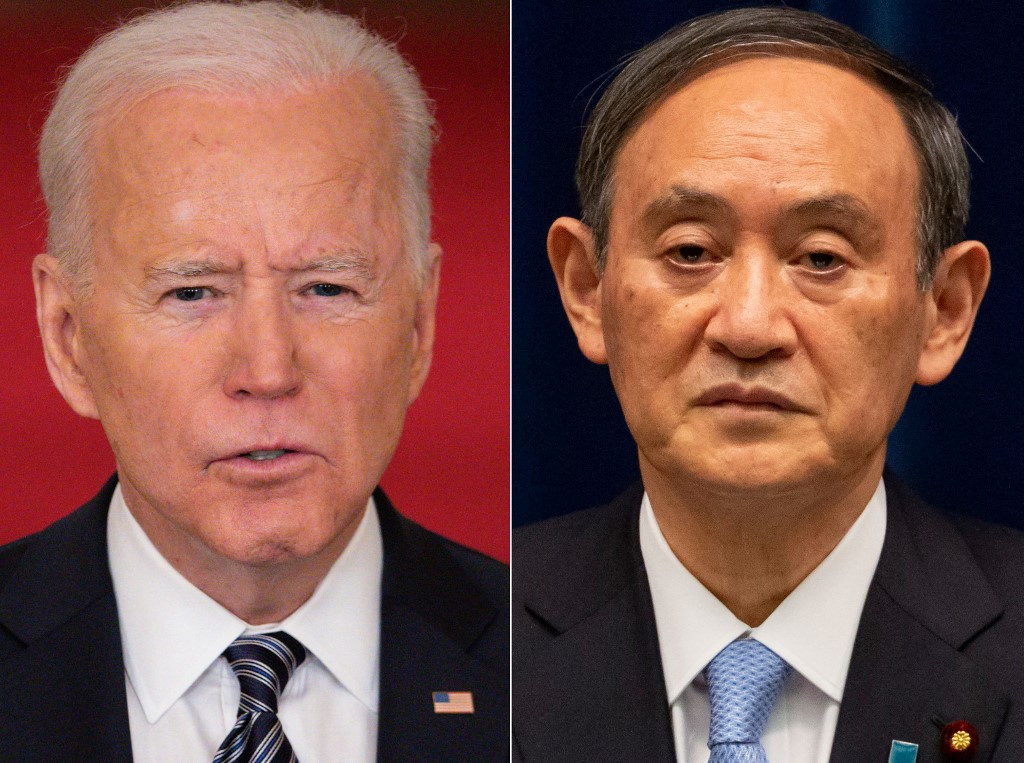Popular Reads
Top Results
Can't find what you're looking for?
View all search resultsPopular Reads
Top Results
Can't find what you're looking for?
View all search resultsBiden, Suga to send signal to assertive China at DC summit
While that emphasis of Japan's key status will be welcome in Tokyo, where some politicians are pushing for a tougher stance towards Beijing, it also raises questions about how far Tokyo can go to meet demands on regional defence and human rights.
Change text size
Gift Premium Articles
to Anyone
 This combination of file pictures created on March 12, 2021 shows US President Joe Biden speaking on the anniversary of the start of the Covid-19 pandemic, in the East Room of the White House in Washington, DC on March 11, 2021, and Japan's Prime Minister Yoshihide Suga attending a press conference in Tokyo in March 5, 2021. Japan said on March 12, 2021 Prime Minister Yoshihide Suga will meet President Joe Biden in the United States next month, becoming the first foreign leader to hold face-to-face talks with him. (AFP/Mandel NGAN, Yuichi YAMAZAKI )
This combination of file pictures created on March 12, 2021 shows US President Joe Biden speaking on the anniversary of the start of the Covid-19 pandemic, in the East Room of the White House in Washington, DC on March 11, 2021, and Japan's Prime Minister Yoshihide Suga attending a press conference in Tokyo in March 5, 2021. Japan said on March 12, 2021 Prime Minister Yoshihide Suga will meet President Joe Biden in the United States next month, becoming the first foreign leader to hold face-to-face talks with him. (AFP/Mandel NGAN, Yuichi YAMAZAKI )
J
apanese Prime Minister Yoshihide Suga and US President Joe Biden will highlight Tokyo's central role in Washington's strategy to counter the challenge of an increasingly assertive China at a summit on Friday.
While that emphasis of Japan's key status will be welcome in Tokyo, where some politicians are pushing for a tougher stance towards Beijing, it also raises questions about how far Tokyo can go to meet demands on regional defence and human rights.
"This will be the precursor to a series of meetings among like-minded countries to send the right signal to Beijing," Kunihiko Miyake, an adviser to Suga, told Reuters.
Suga took over as premier last September, inheriting a China policy that sought to balance security concerns with deep economic ties.
But striking that balance has become harder as China increases maritime activities including in the East and South China Seas and near Taiwan, which Beijing considers a wayward province.
Human rights concerns have deepened over mass detentions of Muslim Uighurs in the Xinjiang region. China denies abuses, but the United States has said Beijing is perpetrating a genocide.
Suga will be the first foreign leader to meet Biden in person since the president took office, something that could give Suga a boost ahead of a general election this year.
"Asking Suga to meet the president first means a lot - that China competition is critical and who is the best partner? Japan," said Toshihiro Nakayama, a political science professor at Keio University.
"That also means that Japan has to do more."
The two are also expected to discuss climate change, supply chain resilience, a global semiconductor shortage and COVID-19.
Japan is grappling with rising coronavirus infections with fewer than 100 days from the planned start of the Summer Olympics in the capital of Tokyo.
'Peace and Stability'
In a statement after a March meeting of US-Japan defence and foreign ministers, the two sides "underscored the importance of peace and stability in the Taiwan Strait" and shared "serious concerns" about human rights in Hong Kong and Xinjiang.
The United States, the European Union, Britain and Canada have imposed sanctions on Chinese officials for human rights abuses in Xinjiang and some Japanese lawmakers think Tokyo should adopt its own law allowing it to do the same - although Japanese executives worry about a backlash.
The Financial Times said on Wednesday Japanese officials were divided over whether Suga should endorse a statement on Taiwan, despite US urging.
A Japanese foreign ministry official said it wasn't decided whether there would be a joint statement after the summit.
Asked to comment, a senior US official said: "We would not want Japan to make any statements that they do not fully support."
Any comments by Suga on either Taiwan or human rights will be closely watched by China, which has warned Tokyo against "being misled" by countries biased against Beijing.
Taiwan is China's most sensitive territorial issue and a source of major friction with Washington, which is required by US law to provide the island with the means to defend itself.
While Tokyo has no official diplomatic relations with Taipei, non-governmental engagement has flourished. Some Japanese lawmakers want even closer ties.
The last time the countries' leaders referred to Taiwan in a joint statement was in 1969, when Japan's prime minister said that the maintenance of peace and security in the "Taiwan area" was important for its own security. That was before Tokyo normalised ties with Beijing.
Japan hosts more than 50,000 US military personnel and, experts say, would be unlikely to stand idly by in any Taiwan crisis, although many ordinary citizens would probably be wary of entanglement.









